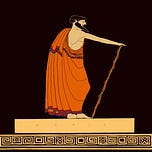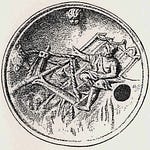Odyssey 3.201-329
Why does Homer introduce a singer and poet into the story of Aegisthus and Clytemnestra? In Nestor’s telling, Agamemnon left behind a singer, like the ones Homer depicts. and perhaps is, with the order to “protect my wife”. How is it that an artist could do that? What sort of song would preserve her virtue—keep her on the straight and narrow? (What language is there any more to speak of this sort of mission?) We know that Nestor had his disagreements with Agamemnon, so that in the aftermath of the Trojan war, he led or joined a faction which fled home rather than try to appease Athena with sacrifice. The army was split fifty-fifty. Odysseus changed his mind and made Agamemnon’s contingent a democratic majority. Is Nestor perhaps mocking Agamemnon’s judgement over his provision for securing his marriage while he was away, busily deserting it? The poor singer meets a terrible fate at Aegisthus’ hands, abandoned to become food for vultures on a desert island. What might Homer himself be saying about the inefficacy of his own art to guide human behaviour and morality? Is there a criticism here of moralising poets? “He wants it—she wants it!” Erotic passion and lust for power conquer in real life, and even win a seven-year term.
[I shall be taking a brief hiatus for some emergency travel. Will be back soon!]
In Greek:














‘He wants it—she wants it!’: Homer in English